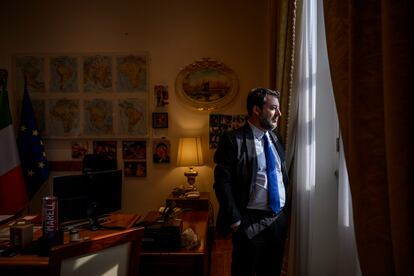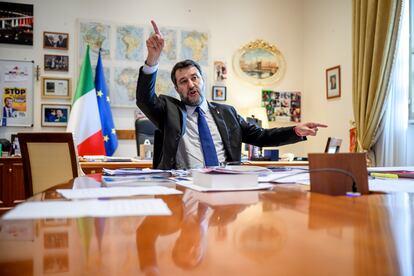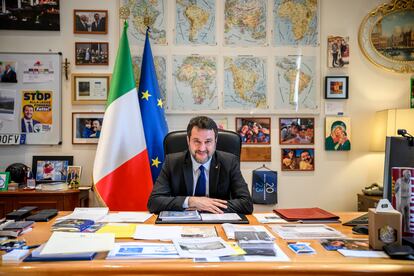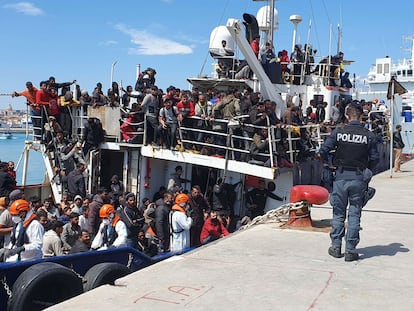Matteo Salvini: ‘The hypothesis of a center-right majority in the European Parliament is closer’
Italy’s deputy PM is promoting alliances that would unite the entire spectrum of the political right in Brussels to evict the left in the 2024 EU elections


The coalition led by right-wing nationalist Prime Minister Giorgia Meloni has been governing Italy placidly since October. The left is broken. There is no opposition. And the three main parties that make up the center-right grouping that emerged triumphant from the snap general election in 2022 (Brothers of Italy, Lega and Forza Italia) appear to be on good terms in public. Lega leader Matteo Salvini holds the positions of Deputy Prime Minister and Minister of Infrastructure and Transportation. However, the three parties now have their sights set on the European elections in 2024, where they are seeking to change the balance of power and the radical right is trying to seduce the European People’s Party (EPP) to distance itself from the Socialist bloc. In this, Italy has once again become a laboratory whose formula could be applied to the whole of Europe. And Salvini, who spoke at length on the subject in an interview with EL PAÍS in his office in Rome, is well aware of the game that is unfolding and the importance of the result of the general elections to be held on July 23 in Spain.
Question. After the Spanish regional and local elections last Sunday, you congratulated [the ultranationalist] Vox and the Popular Party (PP).
Answer. They did very well.
Q. But which do you feel closer to?
A. I have been following the progress made by the premier [of the Madrid region] Isabel Díaz Ayuso [of the PP]. During the pandemic she maintained a totally different position from that of the central government or of Barcelona. And the numbers proved her right from the economic point of view, from the point of view of openings and investments, of real estate value... Madrid has experienced an incredible growth. And the vote has proved her right.
Q. The data on Covid deaths in senior citizens’ homes were not so good.
A. She took risks. But in the end, there were more positives than negatives.
Q. Do you like the Ayuso model?
A. I like a certain type of PP that does not make nods to the left. But I would also meet with [leader of the far-right Vox party Santiago] Abascal: on some issues regarding security and family policies we see things in the same way; on others, such as autonomy, we are somewhat apart.
Q. The results caused the general elections to be brought forward. What impact will that have in Europe?
A. It will have a big impact, as will the Polish elections in autumn. Those are two big countries that can extend a positive trend into June 2024 [when European elections will be held]. The hypothesis of a center-right majority in the European Parliament, which seemed far-fetched a year ago, is closer. What happens in Spain will be important for our vision of Europe.
Q. It seems that the entire political sphere is waiting to see what happens in 2024. Is that the political horizon?
A. Of course. A large part of national policy will depend on the elections in Europe: the issues of cars, of housing... Having a majority that is less ideologically inclined to the left, against the markets, against industry, will be important.

Q. Meloni and the European Conservatives and Reformists Party over which she presides are close to agreeing a pact with the European People’s Party (EPP). Where does that leave Lega?
A. We are fine where we are and we are working to build up our group [Identity and Democracy]. Next week I will meet with André Ventura, from Chega! [the Portuguese far-right party]. And the hope is that next year voters will give strong backing to the axis of the EPP, the Conservatives and the Identitarians.
Q. You proposed an alliance of groups.
A. Individual interests did not allow it. Some people said “no.”
Q. Meloni?
A. More so than in Italy, it was among some foreign delegations. And they were wrong. A big right-wing family would carry more weight.
Q. Are you aware that rejection of parties such as Alternative for Germany or the National Rally in France are preventing it?
A. Until last year Vox was also viewed like that, and it appeared that it couldn’t ever form part of anything. And now they will have a presence in quite a few local governments. But my political friendship is with the French, the Austrians... we know the Germans less well. Everyone is useful, but no one is indispensable. I hope that the EPP will decide once and for all which side it is on. And for that, the Spanish vote will be very important.
Q. Europe’s half-yearly recommendations attack Italy in three aspects: fiscal reform, pensions and autonomy. Three pillars of Lega. Could this create problems in the coalition?
A. For Europe to occupy itself with autonomy is surreal: each country organizes itself as it sees fit. As for the flat tax rate [on personal income tax] we will press ahead: there is no possible caveat. And on pensions, we have a higher average retirement age than Europe. We know exactly what we are doing.
Q. It seems that even you don’t believe you can meet the Brussels deadlines to deploy the (EU Covid-19) recovery funds.
A. That is not the case. The important thing is to spend them well [Salvini presents a dossier with charts and projects]. But if some installments cannot be carried out before 2026, I will apply that funding to another project.
Q. Are you going to build the bridge over the Strait of Messina?
A. Yes, of course. But those funds will not be used. I invite you to see the breaking of ground next summer. The idea is that it will be completed in 2032.
Q. It would be ironic if you, a great former exponent of the Northern League, ended up doing the most important infrastructure work in southern Italy.
A. We will settle 50 years of unfulfilled promises to the south. But it is a competitive advantage for the whole of Italy: ports, airports, companies. An autonomist movement will unite the country.
Q. Your government has reformed the public broadcaster RAI in an ideological way. Are you okay with that?
A. No one has been fired. Some TV hosts who were being paid millions of euros will go to private television stations and earn the same. It is a democracy and they are leaving. And Italy will survive. Balancing the cultural offer seems fair to me, giving a voice to all. The left does not have any cultural superiority, even if there are some who think that in order to make movies, theater or poetry, you have to be left-wing.

Q. That sounds like an ideological claim.
A. It’s about equal opportunities. If there is a good film director or writer, I don’t ask him if he is from the right or the left. There will be openness.
Q. Immigration was a key issue in the election campaign. You and Meloni are the toughest on this issue. But the figures [on arrivals] this year have quadrupled.
A. They are dramatic. We are at the beginning of the summer and we risk ending the year with very high figures.
Q. You called for the resignation of former Interior Minister Luciana Lamorgese for much less.
A. Lamorgese completely threw in the towel. Minister [Mattero] Piantedosi is now traveling all over Italy and we are approving new rules. But if Europe doesn’t intervene, with the chaos in Tunisia and Libya, Italy won’t make it. Not even with more restrictive rules.
Q. So nothing has changed?
A. Europe did little then and it is doing little now. But before, there was not this chaos in North Africa. And I, meanwhile, go to court every week with that Spanish NGO [Open Arms] that, instead of staying in its country, comes to ours. We have the problem in Italy of private associations that manage [migrant] traffic.
Q. Who are you referring to, the NGOs?
A. Yes, I don’t know if it is something that exists in other countries.
Q. I would say that they are carrying out rescue and life-saving work.
A. Part of the phenomenon is managed by them. A rescue is when there is an unforeseen shipwreck. These are organized and financed trips. And with that money, the traffickers buy weapons and drugs.
Q. Could the shipwreck in Cutro (Calabria), where 94 people died, have been avoided?
A. [European Border and Coast Guard Agency] Frontex, the Coast Guard and all the authorities confirmed that they did everything possible, and even the impossible. Nobody avoided their duty.
Q. Frontex sighted the ship after 10 p.m., hours before the shipwreck.
A. No one indicated any imminent risk. Seafarers save lives regardless of the government in power. And Frontex, evidently, had not indicated any imminent risk. Otherwise, the Coast Guard or the Italian Navy would have intervened.
Q. So the original problem was Frontex’s?
A. I have read the records. If the boat departs from Turkey, it passes through other countries before it arrives in Calabria... But I refuse to believe that a sailor would not save someone’s life if he knew the person was in danger. And evidently there was no warning of a life-threatening danger.
Q. Why is there so much resistance to activating rescue operations (SAR) when a vessel of this type is detected instead of deploying, as is the case now, police operations?
A. Because it has been proven that they are organized trips. A SAR implies a rescue for an unforeseen event. In this case, the trips are contracted on the internet: they cost between $5,000 and $10,000, with a starting point and specific duration. We will have to review the regulations of the SAR zones, as these are organized trips.
Q. In the case of Cutro, it was also a shipwreck.
A. Yes, but also organized people smuggling. The traffickers are the criminals, not the Coast Guard.
Q. What are you asking Europe to do?
A. Share the arrivals. And then, adopt the British model: create identification and reception centers in Africa. That is the objective: [determining] who has the right to come and who does not. A Mediterranean border further south. This cannot be done by Italy alone.
Q. You were an admirer of Donald Trump and Jair Bolsonaro. Do you still see them in the same light?
A. I am a lover of democracy. And when they were elected and everyone was attacking them, I remembered that they were children of a democratic vote.
Sign up for our weekly newsletter to get more English-language news coverage from EL PAÍS USA Edition









































